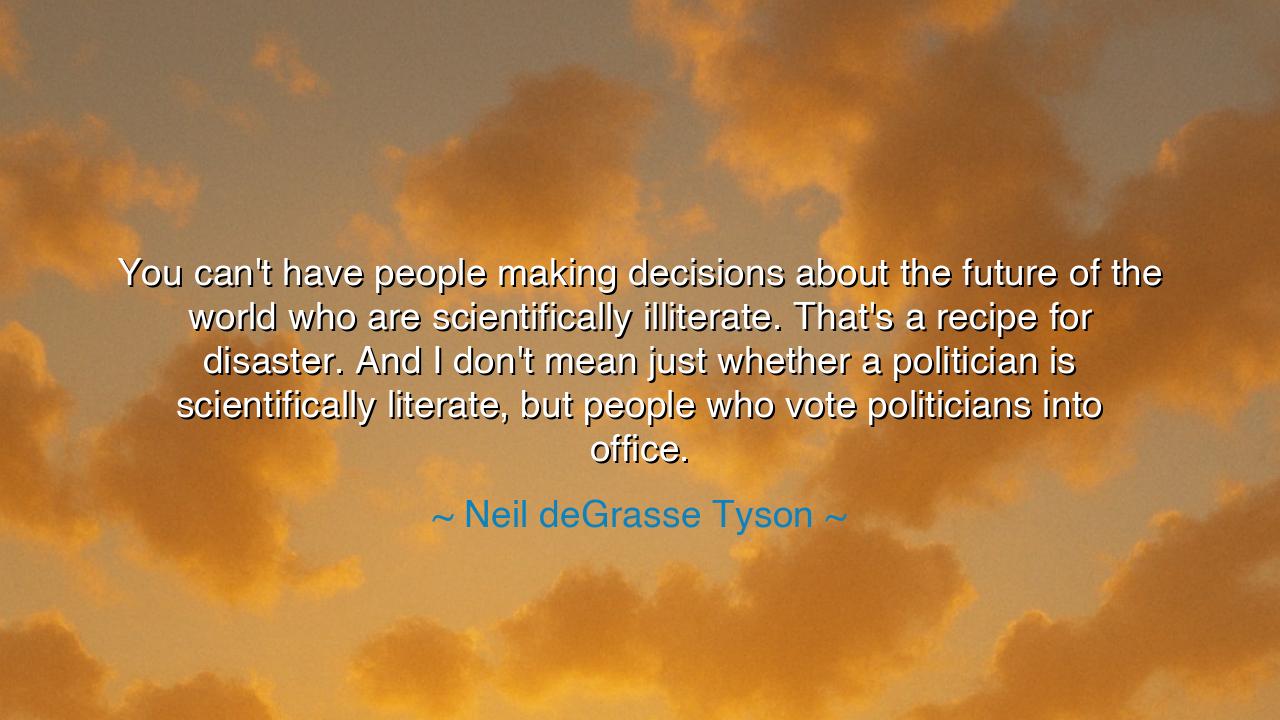
You can't have people making decisions about the future of the
You can't have people making decisions about the future of the world who are scientifically illiterate. That's a recipe for disaster. And I don't mean just whether a politician is scientifically literate, but people who vote politicians into office.






The words of Neil deGrasse Tyson—“You can’t have people making decisions about the future of the world who are scientifically illiterate. That’s a recipe for disaster. And I don’t mean just whether a politician is scientifically literate, but people who vote politicians into office”—resound like the solemn warning of a sage standing before a trembling civilization. His voice, though born of our own age, carries the timeless wisdom of those who have watched empires rise and fall upon the strength—or the blindness—of human understanding. In these words, he speaks not merely of science, but of wisdom itself, and of the sacred responsibility that comes with knowledge. For Tyson reminds us that ignorance in the hands of power is not merely folly—it is peril.
The ancients, too, knew this truth. The philosophers of Greece spoke of logos, the reason that orders the cosmos, and they warned that when the leaders of a people lose touch with reason, chaos follows swiftly after. In every age, nations have flourished or faltered depending on their respect for knowledge. When the rulers of Alexandria built their library, they opened the door to centuries of enlightenment; but when invaders burned it, much of humanity’s learning turned to ash, and with it, the progress of countless generations. Tyson’s words, in our modern tongue, are a cry against the same fate—that the fire of ignorance might once again consume the light of understanding.
For the origin of this quote lies in our own troubled era, where science has built wonders yet often finds itself scorned or misunderstood. Tyson, as both an astronomer and a teacher, has long witnessed the tension between discovery and denial, between those who seek truth and those who fear it. When he warns of scientific illiteracy, he does not speak only of equations and theories, but of the very capacity to discern truth from falsehood, evidence from opinion. His warning is not political—it is existential. He tells us that if those who hold power, and those who grant it, cannot grasp the foundations of reason, they will steer the world blindly into storms of their own making.
History offers countless testaments to this. Recall the tale of Galileo Galilei, who dared to reveal that the Earth moves around the Sun. For this truth, he was silenced by the powers of his time—men who wielded authority without understanding. Their illiteracy of science was not merely a personal failing; it was a wound to civilization. For generations, knowledge was stifled, and the progress of humanity slowed beneath the weight of fear and pride. Such moments remind us that ignorance, when enthroned, can shatter the destiny of nations. Tyson’s words, then, are a call to vigilance—that never again should truth be chained by those who do not comprehend it.
Yet, Tyson speaks also of the people—the citizens, the voters, the ordinary souls whose choices shape the course of nations. He reminds us that democracy, though noble, is only as wise as its people. To cast a vote in ignorance is to hand the keys of the future to chance. If the people themselves are scientifically illiterate, unable to distinguish fact from falsehood, the foundations of progress tremble. For science is not a distant discipline—it is the pulse of modern life, the force behind medicine, energy, climate, and survival itself. The future belongs not merely to the brave, but to the informed.
Consider also the story of Rachel Carson, who, with her book Silent Spring, awakened the world to the dangers of chemical pollution. Her words, grounded in science yet filled with poetry, ignited the environmental movement and led to laws that protected the earth from ruin. But her warnings were resisted by leaders who cared more for profit than for truth. Had ignorance prevailed, the air and waters might have fallen silent indeed. Her courage and literacy in science became the salvation of generations yet unborn. In her, we see Tyson’s message brought to life: the wise must act, or the foolish will destroy what they cannot comprehend.
So let this teaching sink deep into your heart, O seeker of truth: to know is to guard the future. Do not turn away from understanding because it is difficult or unfamiliar. The ancients gazed at the stars and asked questions that shaped civilizations; we must do no less. Learn how the world works—not merely through myth or opinion, but through observation, inquiry, and reason. Teach your children to question, to measure, to wonder. For every mind that learns is a torch that pushes back the darkness.
And thus remember the wisdom of Neil deGrasse Tyson: “You can’t have people making decisions about the future of the world who are scientifically illiterate.” The future demands not blind belief, but enlightened courage. It asks us not to surrender to the noise of ignorance, but to rise above it with clarity and conviction. Be not content with shadows when the light of understanding stands before you. For the fate of the world—its peace, its beauty, its very survival—depends on whether its people choose wisdom over comfort, and truth over fear.






AAdministratorAdministrator
Welcome, honored guests. Please leave a comment, we will respond soon